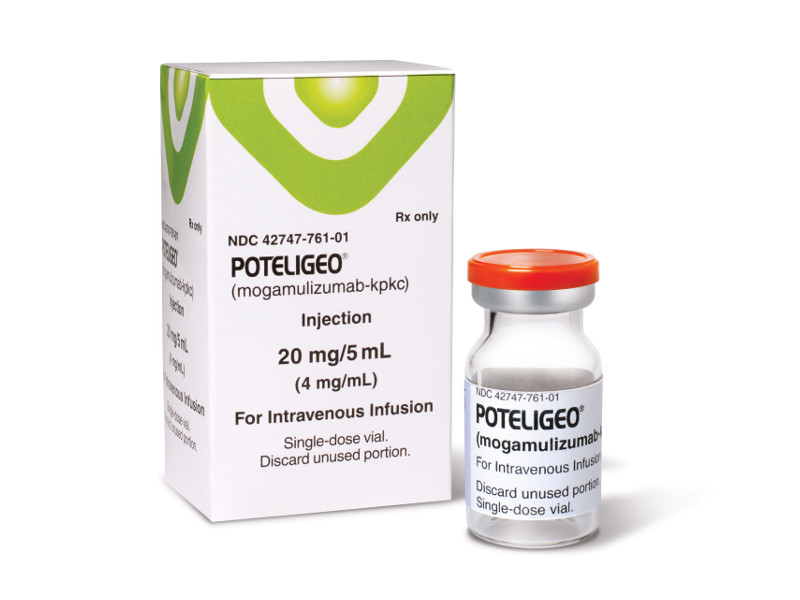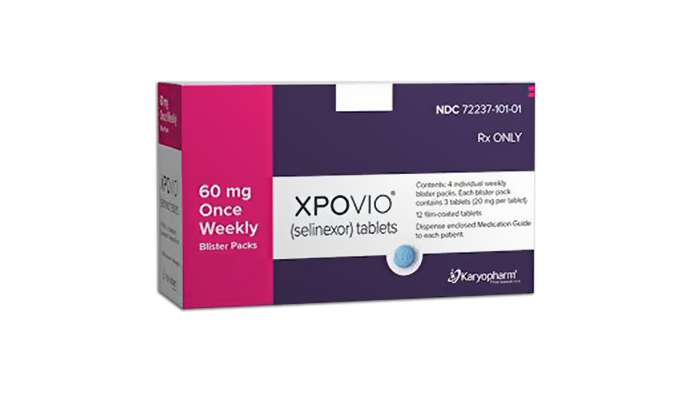Poteligeo (mogamulizumab) vs Xpovio (selinexor)
Poteligeo (mogamulizumab) vs Xpovio (selinexor)
Poteligeo (mogamulizumab) and Xpovio (selinexor) are both used to treat certain types of cancer, but they work in different ways and are approved for different indications. Poteligeo is a monoclonal antibody designed to target the CCR4 protein and is used for the treatment of adult patients with relapsed or refractory mycosis fungoides or Sézary syndrome, which are types of cutaneous T-cell lymphoma. On the other hand, Xpovio is a selective inhibitor of nuclear export used in combination with dexamethasone for the treatment of adults with relapsed or refractory multiple myeloma and, in some cases, for certain types of diffuse large B-cell lymphoma. The choice between these medications would depend on the specific type of cancer a patient has, as well as their overall health, treatment history, and how they have responded to previous cancer therapies. It is essential to consult with a healthcare professional to determine the most appropriate treatment option based on the individual's unique medical condition and circumstances.
Difference between Poteligeo and Xpovio
| Metric | Poteligeo (mogamulizumab) | Xpovio (selinexor) |
|---|---|---|
| Generic name | mogamulizumab-kpkc | selinexor |
| Indications | Relapsed or refractory mycosis fungoides or Sézary syndrome | Multiple myeloma, diffuse large B-cell lymphoma |
| Mechanism of action | CCR4 antagonist, monoclonal antibody | Selective inhibitor of nuclear export |
| Brand names | Poteligeo | Xpovio |
| Administrative route | IV infusion | Oral |
| Side effects | Rash, infusion reactions, fatigue, diarrhea, musculoskeletal pain | Nausea, vomiting, fatigue, anorexia, weight loss, diarrhea |
| Contraindications | Hypersensitivity to mogamulizumab or any component of the formulation | Hypersensitivity to selinexor or any component of the formulation |
| Drug class | Monoclonal antibody | Selective inhibitor of nuclear export (SINE) |
| Manufacturer | Kyowa Kirin | Karyopharm Therapeutics |
Efficacy
Poteligeo (Mogamulizumab) for Lymphoma
Poteligeo (mogamulizumab) is a monoclonal antibody that targets CC chemokine receptor 4 (CCR4), which is frequently expressed on the surface of certain cancer cells, including those in some types of lymphoma. It has been approved by the U.S. Food and Drug Administration (FDA) for the treatment of adult patients with relapsed or refractory mycosis fungoides (MF) or Sézary syndrome (SS), which are types of cutaneous T-cell lymphoma (CTCL). The efficacy of Poteligeo was evaluated in a clinical trial known as the MAVORIC study, which showed that mogamulizumab significantly improved progression-free survival compared to vorinostat in patients with MF and SS who had received at least one prior systemic therapy.
Xpovio (Selinexor) for Lymphoma
Xpovio (selinexor) is a selective inhibitor of nuclear export (SINE) compound that blocks the nuclear export protein exportin 1 (XPO1). This action leads to the accumulation of tumor suppressor proteins in the cell nucleus, potentially restoring their tumor-suppressive function. Xpovio has been granted accelerated approval by the FDA for use in combination with dexamethasone for the treatment of adult patients with relapsed or refractory diffuse large B-cell lymphoma (DLBCL), not otherwise specified, including DLBCL arising from follicular lymphoma, after at least two lines of systemic therapy. The efficacy of selinexor in this indication is based on overall response rate and duration of response in clinical trials, with a subset of patients achieving partial or complete responses.
Comparative Efficacy in Lymphoma
While both Poteligeo and Xpovio are used in the treatment of different types of lymphoma, their efficacy is specific to the subtype of lymphoma for which they have been approved. Poteligeo's efficacy is established for CTCL, specifically MF and SS, whereas Xpovio's efficacy is demonstrated for DLBCL. It is important to note that the approval of Xpovio is based on response rates and has been granted under accelerated approval, which may be contingent upon verification and description of clinical benefit in confirmatory trials.
Considerations for Use
When considering the use of Poteligeo or Xpovio for lymphoma, it is crucial to evaluate the specific lymphoma subtype, the patient's prior treatment history, and the individual patient's overall health status. Additionally, as new data emerge and further studies are conducted, the understanding of the efficacy of these medications may evolve. Healthcare providers should always refer to the most current clinical guidelines and evidence when making treatment decisions for their patients with lymphoma.
Regulatory Agency Approvals
Poteligeo
-
European Medical Agency (EMA), European Union

-
Food and Drug Administration (FDA), USA

-
Therapeutic Goods Administration (TGA), Australia

Xpovio
-
European Medical Agency (EMA), European Union

-
Food and Drug Administration (FDA), USA

Access Poteligeo or Xpovio today
If Poteligeo or Xpovio are not approved or available in your country (e.g. due to supply issues), you can access them via Everyone.org.
How it works

Make an enquiry
Choose the medicine you want to buy, answer a couple of questions, and upload your prescription to speed things up. We’ll get back to you within 24 hours.


Make an enquiry
Choose the medicine you want to buy, answer a couple of questions, and upload your prescription to speed things up. We’ll get back to you within 24 hours.


Breeze through the paperwork
We'll guide you through the required documents for importing unapproved medicine, ensuring you have all the necessary information.


Get a personalized quote
We’ll prepare a quote for you, including medicine costs and any shipping, administrative, or import fees that may apply.


Receive your medicine
Accept the quote and we’ll handle the rest - sourcing and safely delivering your medicine.

Some text on this page has been automatically generated. Speak to your physician before you start a new treatment or medication.
Let's talk
If you have any questions, call us or send us a message through WhatsApp or email:
Contact us




